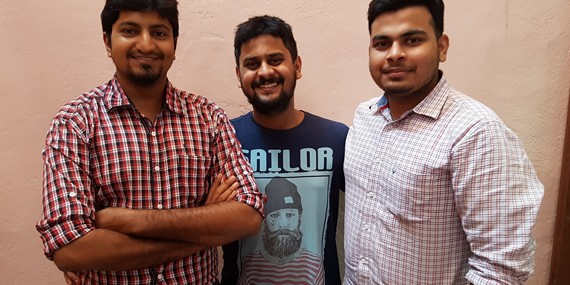Madhur Chauhan, Co-founder of printrove is an enthusiastic apostle of No Sir No Madam movement in India. Madhur Chauhan is the Co-founder and Chief Executive Office of Printrove. He has also co-founded Mobicture with Pankaj Bokdia, an accessories brand in 2015 which aimed mainly at creating beautiful customized and designer mobile accessories. During the initial stage at Mobicture, Madhur encountered various challenges that many other artists and entrepreneurs also endure while setting up their own designer brand.
An engineer graduate, Madhur, along with his school friends Akshay Dughar and Pankaj Bokdia, established Printrove right after graduating college. Even after securing corporate jobs in their college placements, they desired to establish their business in the B2B space.
He gained good knowledge in digital printing processes, e-commerce sales and marketing, warehouse management and order fulfillment. And with all this experience and knowledge, was born Printrove – a white labelled print-on-demand drop shipping service. Madhur rejected a corporate job offer (twice from the same company) and got into 3D printing soon after graduation for about a year, prior to Mobicture and Printrove.
Madhur ensures to adhere to No Sir No Madam routine in his office as well. For their operations, they usually hire people who have not received formal education. Consequently, their employees always address Madhur and his peers as ‘Sir’.
Madhur voices “Some of my employees are older than me. Hence, I feel awkward when they address me as ‘Sir’. Although, I have informed the senior employees to address me by my first-name. Similarly, I have instructed, employees younger than me, to refer me as ‘Anna’. No Sir No Madam custom at the workplace imbibes mutual respect and creates an environment similar to that of working with family members. When employees feel a sense of belonging and responsibility, they in turn work diligently and are more productive,” adds Madhur.
Besides being the co-founder of Printrove, Madhur is also a member of the global startup leadership program. He articulates the culture at this program. “At the startup leadership events, everyone compulsorily has to address each other by their first-name. Irrespective of their age and designation, everyone communicates with each other on a first-name basis. I found this custom interesting as it made conversing much easier sharing ideas with other members, senior or junior.
In continuation, he remarks that eradicating hierarchical barrier even lets employees learn from their mistakes. Madhur enumerates — When employees are not scared of their bosses, they are not afraid of approaching them for any queries or help. I have noticed in my company when newly hired employees would feel hesitant to correspond with me regarding any doubt.
However, building a friendly relation with them, they now, seek my help with a lot more openness. We have been able to maintain this cordial relation only because of continuing No Sir No Madam ideology.
Being no stranger to the existence of ‘Sir/Madam’ culture in government offices, he recounts his recent experience. For the registration of his company, Madhur had to visit a public office official, who was young. He felt disheartened when he noticed the officer’s subordinate, who was older than him, addressed the official as ‘Sir’.
Madhur states that people in higher designation impose a salutation mandate to impose their authority. No Sir No Madam order would also make bureaucrats polite in their dealings with citizens, surmises Madhur.
He reflects upon the implications salutation decree has on blue-collar workers. Madhur mentions, “People working as laborers have been made to exercise salutation edict for centuries. To eradicate the taboos related with their demography, top leaders need to commit to this cause. Liberating them of such prohibitions would encourage them to feel proud of their work. Subsequently, boosting their morale and dignity for themselves.
Madhur ends with a message to all the leaders of organizations. “Leaders and employers ought to inculcate No Sir No Madam tradition in their offices. It is the responsibility of top-level managers that they instill parity and innovative environment at their workplaces. Much more efficiency would be achieved if employees can spend their energy and time on coming up with inventive ideas.”







Add comment